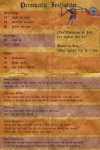BluejayJunior
Explorer
My DM likes to use popcorn initiative a lot. I love that system.
Basically, everyone rolls initiative at the beginning of each round. The person with the highest goes first, but then picks which of their allies goes next. The DM also rolls a die after each player's turn to see if the initiative switches to the monsters.
For us, it keeps us all engaged and actually seems to go faster most of the time. You're rolling each round, but you only care about the highest initiative, so there isn't any bookkeeping.
There can be some weird interactions with some spell durations, like Shield lasting almost 2 full rounds. But usually it doesn't matter. And we don't really care about those things or try to game it at all.
We switch between that and normal initiative, depending on the encounter. Not sure how my DM decided which to use.
Basically, everyone rolls initiative at the beginning of each round. The person with the highest goes first, but then picks which of their allies goes next. The DM also rolls a die after each player's turn to see if the initiative switches to the monsters.
For us, it keeps us all engaged and actually seems to go faster most of the time. You're rolling each round, but you only care about the highest initiative, so there isn't any bookkeeping.
There can be some weird interactions with some spell durations, like Shield lasting almost 2 full rounds. But usually it doesn't matter. And we don't really care about those things or try to game it at all.
We switch between that and normal initiative, depending on the encounter. Not sure how my DM decided which to use.

